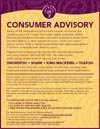 Some fish have more, some less. But "nearly all fish and shellfish contain traces of methylmercury", say the FDA and the EPA.
Some fish have more, some less. But "nearly all fish and shellfish contain traces of methylmercury", say the FDA and the EPA.That mercury is a result of global industrial waste. And it's not going to go away anytime soon.
If I had my druthers, I'd eat some type of fish every other day. But I've put a limit on my druthers because I get the willies thinking what mercury can do to my body. As a neurotoxin, it damages nerves, resulting in:
- Blurred vision
- Hearing loss
- Speech difficulties
- Tremors
- Memory loss, and other mental effects (irritability, depression)
- Kidney damage
- High blood pressure
- Heart attack
- Infertility
The best I can do, on a personal level, is choose fish with the lowest levels of mercury. How do I know what fish they are? The FDA/EPA has published a list of common fish/shellfish and their mercury levels.
It's by no means comprehensive or even accurate when you consider the age of their data and the challenges to its accuracy put forth by media and citizens' groups, e.g. the Environmental Working Group (EWG).
But it's a list. Associated with this list is a warning the FDA and EPA made jointly to all citizens in 2004. The warning is still in effect; if anything it's even more pertinent now. Do you know what the warning is? It advises women of child-bearing age and children not to eat certain types of fish and to limit consumption of others. Government1 and industry must think everyone knows what these fish are, since they're resistant to having this information posted at, say, a fish counter where the bulk of consumer purchasing decisions are made.
I think the seafood industry is concerned that people won't buy fish with high levels of mercury.
Anyway, I think it's a great idea to post mercury information at seafood counters and in the canned tuna aisle. Oceana.org does too. They're a not-for-profit group of marine scientists, economists, lawyers and advocates dedicated to protecting the world's oceans. They're calling on grocery stores to voluntarily post the FDA/EPA Advisory. So far, Wild Oats and Safeway stores have agreed.
 Here's Wild Oat's sign (Click for pdf):
Here's Wild Oat's sign (Click for pdf): Here's Safeway's sign (Click for pdf):
Here's Safeway's sign (Click for pdf):Oceana.org is encouraging us to encourage our grocer to post the advisory. I know I won't be making any friends doing this, but I may raise the subject on my next visit to Whole Foods. I'll start with something like, "Can you tell me which fish have the most mercury?" Oceana.org has a whole Tell-Your-Grocer Kit, with sample letters, signs, and talking points. But I think I'll start small.
 1 The state of California is an exception. They have a law requiring seafood counters to post advisories like this (Click for larger):
1 The state of California is an exception. They have a law requiring seafood counters to post advisories like this (Click for larger):
No comments:
Post a Comment